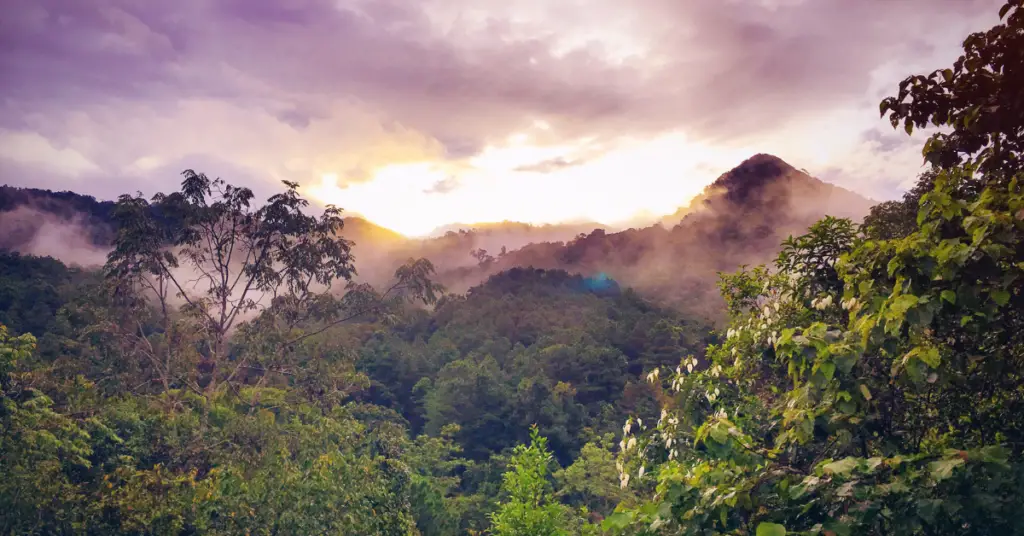Biologists estimate that species extinctions are currently 500 to 1,000 times higher than the normal or background rate observed earlier in Earth’s history. Sometimes is difficult to predict which species will disappear, many are listed as Vulnerable (Critically Endangered).
However, many extinctions will affect species that biologists have yet to discover, for example, those species that live in tropical forests such as those in the Amazon Basin. These rainforests are the most diverse ecosystems on the planet and are rapidly being destroyed by deforestation. In 41 years, nearly 20% of the Amazon rainforest was lost, so many species remained unknown to the science.
Biodiversity is a general term for biological diversity and can be measured at different organizational levels. The ecologists have measured biodiversity by considering both the number of species and the number of individuals of each species (known as relative frequency). However, biologists use different measures of biodiversity, including genetics.
The loss of a particular species may seem irrelevant to some, especially if it is not a charismatic species such as the Bengal tiger or the bottlenose dolphin. Much of this loss is occurring in tropical rainforests, which are very rich in biodiversity but are allowed for timber and agriculture. This is going to have dramatic implications for human well-being with the degradation of ecosystems.
Biologists acknowledge that humans are integrated and dependent on ecosystems just like any other species on the planet. Today, our technology softens the harshness of existence and allows many of us to live longer, more comfortable lives, but ultimately the human species cannot exist without the ecosystems that surround it.
Biodiversity importance is in ecosystems that support us with food, medicine, clean air and water, recreation, and spiritual and aesthetic inspiration. A common meaning of biodiversity is simply the number of species in a place or on the planet.
Useful is to define ecosystem diversity as the number of different ecosystems on Earth or in a geographic area. The loss of an ecosystem means the loss of interactions between species and the loss of biological productivity that prairies once stretched across central North America, from the boreal forests of northern Canada to Mexico. Now they are all but gone, replaced in by farmland, grazing land, and suburban sprawl.
Many species survive, but the highly productive ecosystem that was responsible for creating our most productive farmland is now gone. As a result, their lands are depleting unless artificially tended at great expense. The downwards trend in soil productivity occurs because the interactions in the original ecosystem have been lost.
The current rate of species discovery, which according to the State of Observed Species reports is 17,000–20,000 new species per year, it would take almost 500 years to describe all, which becomes increasingly impossible over time, as extinction is wiping out Earth’s species faster than we find out about them.
This additional research will yield discoveries that make the species valuable to humans and our ecosystems. Without a name and without a description, a species cannot be studied and coordinated in depth by several scientists.
Biodiversity is not evenly spread on the planet. The work of biogeographers is essential to understanding our physical environment, such as the environment affects species and how changes in the environment affect the distribution of a species. There are three main areas of study under the title of biogeography: ecological historical biogeography – paleobiogeography and conservation biogeography.
Ecological biogeography studies the factors affecting the distribution of plants and animals. Historical biogeography is the study of the past distribution of species. Conservation biogeography focuses on the protection and restoration of species based on known historical and current ecological information.
Biodiversity generally increases as latitude decreases. The places with the most biodiversity are situated close to the equator.

Erzsebet Frey (Eli Frey) is an ecologist and online entrepreneur with a Master of Science in Ecology from the University of Belgrade. Originally from Serbia, she has lived in Sri Lanka since 2017. Eli has worked internationally in countries like Oman, Brazil, Germany, and Sri Lanka. In 2018, she expanded into SEO and blogging, completing courses from UC Davis and Edinburgh. Eli has founded multiple websites focused on biology, ecology, environmental science, sustainable and simple living, and outdoor activities. She enjoys creating nature and simple living videos on YouTube and participates in speleology, diving, and hiking.

